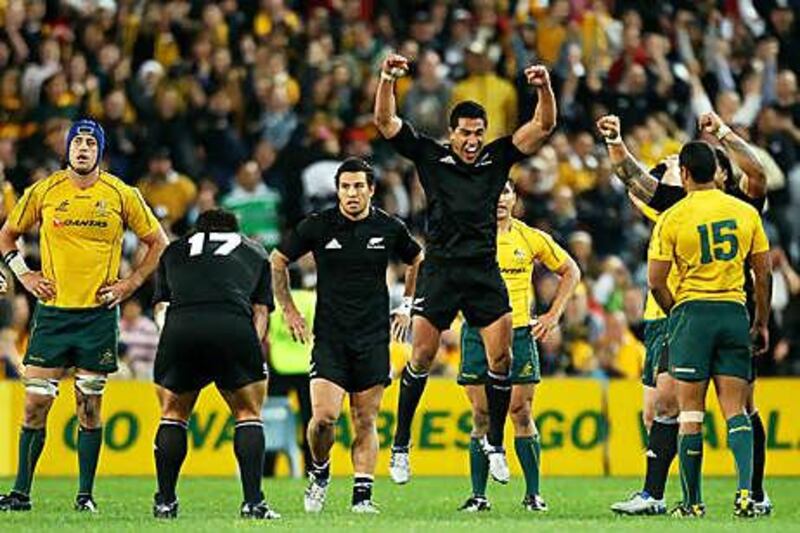SYDNEY // New Zealand's sweep of the Tri Nations affirmed their status as rugby's top dogs but Australia's rapid improvement in the tournament suggests an All Blacks' World Cup victory may not be a foregone conclusion. The Wallabies' gut-wrenching 23-22 loss in the final Tri Nations match in Sydney on Saturday condemned them to a record streak of 10 defeats to the All Blacks.
It also left them with an unflattering record of two wins and four defeats for the tournament and lingering doubts about their ability to land a killer blow against their arch-rivals with the World Cup in New Zealand just a year away. However, despite the disappointing conclusion in Sydney, surrendering a late 13-point lead after dictating much of the play, the Wallabies emerged from the tournament with a greater resolve and the No 2 ranking, replacing South Africa.
"Two out of six is obviously disappointing, but I think to play the game that we did ? does show that we've come a long way and it shows that if we just keep working and keep building we'll get there," Will Genia, the scrum-half, said on Saturday. "It was our game to be won. It's all good saying it now after the game's over but we've just got to make sure that we keep going. If we're good enough to get to a 22-9 lead then we're good enough to keep playing and score another 22 points."
Playing havoc with the selections of coach Robbie Dean, a number of injuries to key players actually proved an unlikely blessing for the Wallabies, with their replacements stepping up and in some cases blossoming. Quade Cooper, who was given his start on the season-ending northern hemisphere tour last year after an ankle injury to Berrick Barnes, has made the fly-half position his own and looms as a threat with both hand and foot in tandem with Genia.
The losses of Digby Ioane, Rob Horne and Peter Hynes hurt Australia's back line, but also allowed youngster James O'Connor to show his versatility out wide, while Adam Ashley-Cooper's shift outside of centre Matt Giteau has shored up the defence. Kurtley Beale, whose last-gasp, long-range penalty felled the Springboks in Bloemfontein last week to break a 47-year losing streak on the highveld, has also proved a revelation despite the full-back committing the odd farcical error.
"I think they're playing exciting football and the passes are sticking now. That's a result of the understanding between them and the development," said Rod Macqueen, the 1999 World Cup-winning Australia coach. Australia had assembled a side whose running and passing was the equal of the All Blacks, if not better, but remained prone to "switching off" after scoring tries, said Andrew Slack, the Wallabies Hall of Famer.
Slack also joined a chorus of disapproval over Australia's goal-kicking, with Giteau's woeful three-out-of-seven on Saturday magnified by Piri Weepu's perfection at the other end. "It is a major issue. If you look in the history of World Cups, so many of them are won by a kick of one degree or another." Added Slack: "Either turn Matt Giteau into a better goal kicker, a more consistent one, or find someone else."
Australia's chances of catching up to the seasoned All Blacks in time for the World Cup remain in doubt so long as the young Wallabies remain prone to falling apart with victory in reach. * Reuters





